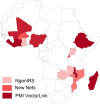Process and Methodological Considerations for Observational Analyses of Vector Control Interventions in Sub-Saharan Africa Using Routine Malaria Data
- PMID: 37604476
- PMCID: PMC11720682
- DOI: 10.4269/ajtmh.22-0757
Process and Methodological Considerations for Observational Analyses of Vector Control Interventions in Sub-Saharan Africa Using Routine Malaria Data
Abstract
Progress in malaria control has stalled in recent years. With growing resistance to existing malaria vector control insecticides and the introduction of new vector control products, national malaria control programs (NMCPs) increasingly need to make data-driven, subnational decisions to inform vector control deployment. As NMCPs are increasingly conducting subnational stratification of malaria control interventions, including malaria vector control, country-specific frameworks and platforms are increasingly needed to guide data use for vector control deployment. Integration of routine health systems data, entomological data, and vector control program data in observational longitudinal analyses offers an opportunity for NMCPs and research institutions to conduct evaluations of existing and novel vector control interventions. Drawing on the experience of implementing 22 vector control evaluations across 14 countries in sub-Saharan Africa, as well as published and gray literature on vector control impact evaluations using routine health information system data, this article provides practical guidance on the design of these evaluations, makes recommendations for key variables and data sources, and proposes methods to address challenges in data quality. Key recommendations include appropriate parameterization of impact and coverage indicators, incorporating explanatory covariates and contextual factors from multiple sources (including rapid diagnostic testing stockouts; insecticide susceptibility; vector density measures; vector control coverage, use, and durability; climate and other malaria and non-malaria health programs), and assessing data quality before the evaluation through either on-the-ground or remote data quality assessments. These recommendations may increase the frequency, rigor, and utilization of routine data sources to inform national program decision-making for vector control.
Conflict of interest statement
Disclosure: The findings and conclusions in this report are those of the author(s) and do not necessarily represent the official position of the U.S. Agency for International Development.
Figures
References
-
- World Health Organization, 2021. World Malaria Report 2021. Available at: https://apps.who.int/iris/handle/10665/350147. Accessed January 19, 2022.
Publication types
MeSH terms
Substances
LinkOut - more resources
Full Text Sources
Medical
Research Materials


